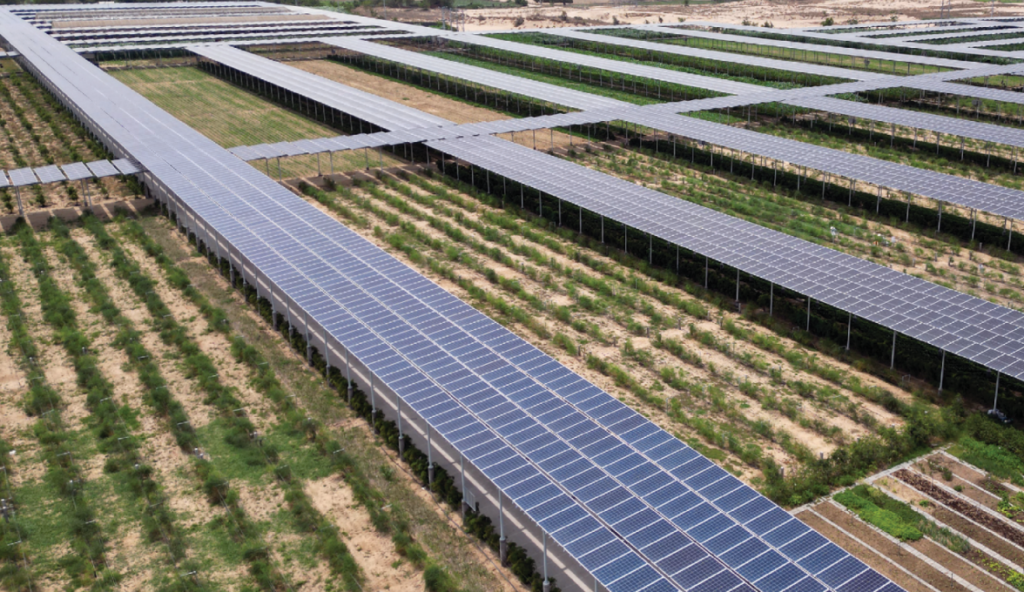A robust carbon credit market has emerged as a crucial tool in Vietnam’s journey to achieving its net-zero commitments and sustainable development.
On September 29 in Ho Chi Minh City, real estate company the CT Group officially introduced the Carbon Credit Trading Platform ASEAN Joint Stock Company (CCTPA), becoming the first in Vietnam to initiate a carbon credit trading platform, adapting to international environmental trade policies and targeting a low-carbon, rapidly-developing economy.

New playgroup
“In a globalized world, establishing a carbon credit and green finance market is an essential move to enhance global competitiveness,” said Ms. Hoang Bach Duong, Permanent Vice Chairwoman of the CT Group. “Meeting standards on carbon tax barriers set by major markets will play a decisive role in the new race within global supply chains.”
From October, the 27 EU member countries initiated a carbon tax trial on all exports using the Carbon Border Adjustment Mechanism (CBAM). Importers are required to report on the volume of goods affected by the carbon adjustment mechanism when importing into the bloc. The CBAM mechanism is expected to significantly affect Vietnamese exporters to the EU, especially in sectors with high emission risks such as steel, aluminum, oil refining, cement, paper, glass, fertilizer, and energy. These are industries with a high risk of leakage and substantial carbon emissions, accounting for 94 per cent of the EU’s industrial emissions. The US is set to be the next to implement a carbon tax on imports, in 2024, and it is anticipated that more countries in the Americas and Asia, including Vietnam, will and must follow the trend in the future.
According to Mr. Nguyen Vo Truong An, Deputy General Director of the CCTPA, the carbon market is seen as a solution and key to achieving Vietnam’s net-zero goals. The market operates on the principle that the “polluter” must pay a compensatory fee for the amount of emissions released into the environment, through the buying and trading of carbon credits.
Greenhouse gases emitted into the environment from production and commercial and service activities, with a significant portion being carbon dioxide, are the main cause of climate change, Mr. An explained. The carbon credit market incentivizes businesses to invest in emission reduction and clean energy projects, promoting sustainability. By measuring and trading credits, it stimulates innovation and encourages adherence to international environmental standards, fostering new business opportunities in climate change adaptation initiatives and clean energy development.
“The main mission of the CCTPA is to encourage and mobilize the entire population to participate in the development of green projects, emission reductions, deforestation prevention, improvements to agricultural activities, reductions of plastic waste, and many other activities,” he said. In parallel, the CCTPA supports advisory programs for businesses and individuals to achieve carbon credit outcomes. “The CCTPA aims to become the most robust carbon credit platform in ASEAN, and aspires to contribute to the sustainable development of Vietnam and other ASEAN countries by verifying, measuring, and monitoring emission reduction projects and environmental protection initiatives while providing solutions for organizations and individuals to minimize their impact on the environment and contribute to mitigating climate change,” he said.
Prospects & problems abound
According to Dr. Nam Nguyen, Climate Change Expert on MSME Development at the United Nations, Vietnam’s economy is composed of numerous businesses and the production and creation of material wealth for society inevitably generates greenhouse gases as a consequence of economic activity.
However, the application of scientific and technical knowledge, along with green transformation, enables businesses to contribute to the collective responsibility of the nation and leverage resources from the carbon market and a climate finance market for a more sustainable green transition. This also aids the country in fulfilling its international commitments. “A carbon market is absolutely necessary in Vietnam and in other countries worldwide,” Dr Nam said. “It is one tool among many policy instruments that facilitate the favorable development of the market and help businesses access capital.”
Establishing a domestic carbon credit market will provide significant motivation for businesses in their green transition process, he believes. With support in terms of policies, incentives, direction, and capital resources, Vietnamese businesses will have more opportunities to compete with others worldwide and contribute to enhancing the competitiveness of Vietnamese manufactured goods. “A carbon credit trading market is fundamentally a financial product, which will enable stable businesses to reinvest and expand production in a more sustainable direction and produce higher quality products,” he explained. “From this perspective, Vietnam will have a greater advantage compared to importing countries, as it can create valuable products while simultaneously protecting the environment.”
According to Ms. Pham Ngoc Thuy, Director of the Private Economic Development Research Office at the Office of the Government, many businesses view this as a significant opportunity. The results achieved through the application of technology or process improvements in green transition create credits that can serve as “savings” and be traded, thereby increasing the value of products and services compared to traditionally-made products.
In terms of challenges, she went on, obtaining a specific product, quota, or credit all require transformation by businesses. A simple initial step is for businesses to inventory all items that are currently generating greenhouse gases, also known as greenhouse gas inventories. The government has initially issued a list of 1,912 businesses that are required to inventory their greenhouse gases and meet emission quotas. However, how best to conduct an inventory, what to do after inventorying, and how to identify high-emission sources that businesses need to prioritize resources to see improvements in, all pose significant challenges, requiring business knowledge, considerable financial resources, and the restructuring of internal management processes. In the context of general difficulties in cash flow and operations in the post-Covid-19 world, the challenges facing businesses will be even greater.
“Previously, only a small fraction of businesses actively invested in green transition models, while the remainder were preoccupied with regular production and business challenges,” Ms. Thuy noted. However, since Vietnam made a strong commitment at COP26 and has specific policy designs, such as building a carbon credit market, businesses have begun to change their mindset and see new opportunities. “After many conversations with businesses and from policy research, we recognize the pressure from regulations in international markets,” she said. “Therefore, if Vietnam can transparently operate a carbon market and comply with international regulations, this could serve to increase confidence in Vietnam’s export products.”
According to Mr. An, the carbon credit trading platform model will bring many advantages and benefits to both buyers and sellers. This is one of the factors that needs to be promoted, to further enhance awareness among businesses specifically about carbon credits.
For buyers, the carbon credit trading platform simplifies the process of accessing reliable carbon credits and diversifies supply sources. It achieves this by connecting buyers with various suppliers, ranging from individuals to organizations and from emission reduction projects to clean energy providers, enabling buyers to have diverse options to purchase carbon credits according to their needs. Additionally, the carbon credit trading platform can reduce risks for buyers by ensuring transparency and the authentication of the carbon credits being traded.
For sellers, the platform will create a market for organizations, businesses, and individuals to sell carbon credits they have accumulated through emission reductions, thereby enhancing their value. It will also promote and widely communicate Vietnam’s commitment to net-zero, not only domestically but also internationally, motivating businesses and organizations to implement emissions reduction measures.
“The carbon credit market in general, and carbon credit projects in particular, remain relatively new in Vietnam but are gradually gaining the attention of businesses,” Mr. An believes, noting that tight cooperation between the community, businesses, and citizens is very much needed to further advance the carbon credit market in Vietnam as a whole, with three key solutions, including establishing a framework, designing the structure, and ensuring synchronized implementation.
Soucre: Vietnamtimes









